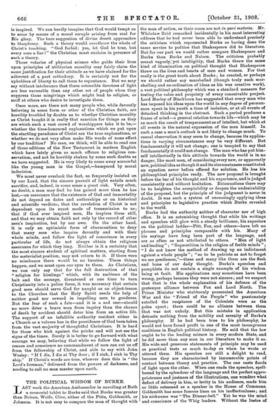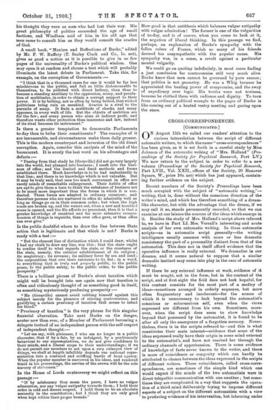THE POLITICAL WISDOM OF BURKE.
JIST week the American Ambassador in unveiling at Bath a memorial tablet to Burke said that Burke was greater than Nelson, Wolfe, Clive, either of the Pitts, Goldsmith, or Johnson. It is not easy to compare the man of thought with the man of action, as their cases are not in pan i maieria. M. Whitelaw Reid remarked incidentally in his most interesting address that be bad never been able to understand precisely the criticism which represented Burke as having done the same service to politics that Shakespeare did to literature. But for our part we would rather compare Shakespeare and Burke than Burke and Nelson. The criticism probably meant vaguely,'yet intelligibly, that Burke threw the same kind of illumination on political thought that Shakespeare threw on the lives and hearts of men and women. For that really is the great truth about Burke ; he created, or perhaps we should rather say marshalled (though truly such mar- shalling and co-ordination of ideas as his was creative work), a vast political philosophy which was a standard measure for testing the value and propriety of every conceivable project. Lord Morley of Blackburn has suggested that every man who has imposed his ideas upon the world in any degree of perman- ence spent in his youth a time of isolation, or at all events of detached thinking in the abstract. Such a period produces a frame of mind—a general relation towards life—which may be as much the result of temperament as of intellect, but which at all events is the natural expression of the man himself. In such a case a man's outlook is not likely to change much. To casual observation it may seem to change, because its applica- tions in varying circumstances may be very different. But fundamentally it will not change; one is tempted to say that fundamentally it could not change. The man who has put him- self intellectually in this attitude towards the world is in no danger, like most men, of considering every new, or apparently new, political idea as though it and its circumstances constituted an equation never before offered for solution. He has his philosophical principles ready. The new proposal is brought before the bar of his thought and his experience, and is judged consistently and without hesitation. Extennations there may be to heighten the acceptability or deepen the undesirability of the proposal, but the principle of the judgment is never in doubt. It was such a system of unceasingly applying ideas and principles to legislative practice which Burke revealed to the world.
Burke had the authority neither of character nor of high office. It is an astonishing thought that while his writingi and speeches still glow with a steady brilliance, his superiors on the political ladder—Pitt, Fox, and others—have left no phrases and principles comparable with his. Many of his sayings have long been part of the language, and are as often as not attributed to others. "Men of light and leading" ; "Superstition is the religion of feeble minds "; "I do not know the method of drawing up an indictment against a whole people " ; "so to be patriots as not to forget we are gentlemen,"—these and many like them are the flesh and bone of our daily thought. Burke's speeches and pamphlets do not contain a single example of his wisdom being at fault. His applications may sometimes have been wrong, perhaps because they were not sincere ; and we suspect that that is the whole explanation of his defence of the grotesque alliance between Fox and Lord North. The Prime Minister who stubbornly prosecuted the American War and the "Friend of the People" who passionately extolled the restance of the Colonists were as the poles apart ; there could be no alliance between them that was not unholy. Bat this mistake in application detracts nothing from the nobility and serenity of Burke's philosophy. If he had been true to his philosophy, he would not have found profit in one of the most incongruous coalitions in English political history. He said that the law ought to be the leading science in every modern State, and he did more than any man in our literature to make it so. His wide and generous statements of principle may be used as practical tests as much to-day as when he wrote or uttered them. His speeches are still a delight to read, because they are characterised by innumerable points of contact between theory and practice. The one casts floods of light upon the other. When one reads the speeches, spell- bound by the splendour of the language and the perfect appro- priateness and justness of the illustrations, one wonders what defect of delivery in him, or levity in his audience, made him so little esteemed as a speaker in the House of Commoni. Goldsmith has some famous lines on his ineffectualness; and his nickname was "The Dinner-bell." Yet he was the mind and conscience of the Whig leaders. Without the lustre of his thought they were as men who had lost their way. His great philosophy of politics succeeded the age of small factions, and Windham said of him in his old age that men came to consult him as they would consult the oracles of God.
A small book, "Maxims and Reflections of Burke," edited by Mr. F. W. Raffety (T. Sealey Clark and Co., Is. net), gives as good a notion as it is possible to give in so few pages of the universality of Burke's political wisdom. One may open it at random and choose a text which will probably illuminate the latest debate in Parliament. Take this, for example, On the corruption of Governments :—
"I think that in a thousand cases for one it would be far less mischievous to the public, and full as little dishonourable to themselves, to be polluted with direct bribery, than thus to become a standing auxiliary to the oppression, usury, and pecula- tion of multitudes, in order to obtain a corrupt support to their power. It is by bribing, not so often by being bribed, that wicked politicians bring ruin on mankind. Avarice is a rival to the pursuits of many. It finds a multitude of checks, and many opposers, in every walk of life. But the objects of ambition are for the few; and every person who aims at indirect profit, and therefore wants other protection than innocence and law, instead of its rival becomes its instrument."
Is there a greater temptation to democratic Parliaments to-day than to bribe their constituents ? The examples of it are innumerable, and circumstances make them daily grosser. This is the modern counterpart and inversion of the old direct corruption. Again, consider this analysis of the mind of the bureaucrat. It is surely the last word on his advantages and defects :— " Passing from that study he (Grenville) did not go very largely into the world, but plunged into business ; I mea'h into the busi- ness of office; and the limited and fixed methods and forms established there. Much knowledge is to be had undoubtedly in that line; and there is no knowledge which is not valuable. But it may be truly said, that men too much conversant in office are rarely minds of remarkable enlargement. Their habits of office are apt to give them a turn to think the substance of business not to be much more important than the forms in which it is con- ducted. These forms are adapted to ordinary occasions ; and therefore persons who are nurtured in office do admirably well as long as things go on in their common order; but when the high roads are broken up, and the waters out, when a new and troubled scene is opened, and the file affords no precedent, then it is that a greater knowledge of mankind and far more extensive compre- hension of things is requisite, than ever office gave, or than office can ever give."
Is the public doubtful where to draw the line between State action that is legitimate and that which is not ? Burke is ready with a test :—
" But the clearest line of distinction which I could draw, whilst I had my chalk to draw any line, was this : that the state ought to confine itself to what regards the state, or the creatures of the state, namely, the exterior establishment of its religion ; its magistracy; its revenue ; its military force by sea and land ; the corporations that owe their existence to its fiat ; in a word, to everything that is truly and properly public, to the public peace, to the public safety, to the pnblic order, to the public prosperity."
There is a brilliant phrase of Burke's about taxation which might well be brought into use again now that taxation is often and ridiculously thought of as something good in itself, as something mysteriously producing prosperity :—
"He (Grenville) cannot avoid rubbing himself against this subject merely for the pleasure of stirring controversies, and gratifying a certain pruriency of taxation thal seems to infect his blood."
"Pruriency of taxation" is the very phrase for this singular financial aberration. Take next Burke on the danger, Boater now than ever, of a Member of Parliament becoming a delegate instead of an independent person with the self-respect of independent thought :— "Let me say, with plainness, I who am no longer in a public character, that if by a fair, by an indulgent, by a gentlemanly behaviour to our representatives' we do not give confidence to their minds, and a liberal scope to their understandings; if we do not permit our members to act upon a very enlarged view of things, we shall at length infallibly degrade our national repro- sehtation into a confused and scuffling bustle of local agency. When the popular member is narrowed in his ideas, and rendered timid in his proceedings, the service of the crown will be the sole nursery of statesmen.'
In the House of Lords controversy we might reflect on this
passage
"If by aristocracy they mean the peers, I have no vulgar admiration, nor any vulgar antipathy towards them ; I hold their order in cold and decent respect. I hold them to be an absolute necessity in the constitution; but I think they are only good when kept within their proper bounds."
How good is that antithesis which balances vulgar antipathy with vulgar admiration ! The former is one of the vulgarities of to-day, and is of course, when you come to look at it, the negation of liberal thinking. In this passage we find, perhaps, an explanation of Burke's sympathy with the fallen rulers of France, which so many of his friends deemed too unsympathetic with the popular cause. His sympathy was, in a sense, a revolt against a particular mental vulgarity.
We could go on quoting indefinitely, in most cases finding a just conclusion for controversies still very much alive. Burke knew that men cannot be governed by pure reason ; that politics is not geometry. He was a Whig because he appreciated the healing power of compromise, and the away of expediency over logic. His truths were not truisms, because he clothed them with radiance and dignity. To turn from an ordinary political wrangle to the pages of Burke is like coming out of a heated vestry meeting and gazing upon the stars.















































 Previous page
Previous page